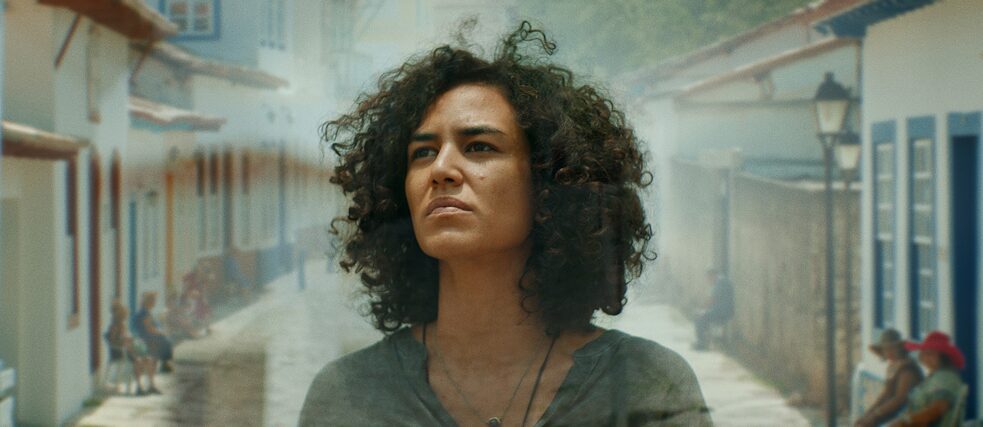Berlinale Bloggers 2022
“As soon as we held our heads up, we became a nuisance to them”

“Fogaréu”, Flávia Neves's debut feature, reveals a history of violence buried in Brazil's colonial past – and resurgent today. The filmmaker talks about how the film came about in an interview.
By Camila Gonzatto
After the death of her adoptive mother, Fernanda (played by Bárbara Colen) returns to her home town in central Brazil to find out the truth about her past. She is received by her wealthy, conservative uncle’s family, who play a leading part in local politics and agribusiness. During her stay, she is confronted with the history of “neurodiverse” people – locally referred to as “bobos” (idiots) – adopted as children to serve the households of wealthy families.
Ms Neves, some aspects of Fogaréu are clearly autobiographical. How exactly do you meld fact and fiction in the film?
Several years after I’d heard about the “bobos” in the state of Goiás, I decided to look into this disturbing chapter in our history, which wouldn't let me go. I was born and raised in Goiânia, the capital of Goiás, but hadn’t heard about the “bobos” till I was living in Niterói. So in 2014, I went back to Goiás to find out about them and someone told me to read what’s probably the only book on the subject: Os 'bobos' em Goiás: enigmas e silêncios (The “Bobos” of Goiás: Secrets and Silences) by Marilucia Melo Meireles.
After reading the book, it was clear to me I had to tell this story. I visited the mental asylum in which many of these people now live. And during those ten days in Goiás I drafted a screenplay that was subsequently to remain unchanged in structure. It wasn’t till I was elaborating the script, however, that I found out that I myself had more to do with this whole story than I cared to.
I realized that my interest in the subject also stemmed from a buried family history. Like the “bobos”, my mother was adopted at the age of 12 to work in a family household. It took me a while to include myself in the story because that involved facing up to deep-seated sorrow and traumas I’d been ignoring my whole life long.
How did you prep the actors for the film?
I’d always intended to cast neurodiverse actors, to show their world, their talents and their present-day lives. And to show what new dynamics they can contribute to artistic processes. So I started looking into theatre groups, workshops, institutions and schools for the neurodiverse, and came across some incredible projects and very gifted actors. And that changed my own perspective on things too.
Why did you add fantasy elements to the narrative?
The fantastic is omnipresent in the culture of Goiás. Much of our oral history is about superstition and the supernatural. It’s a cultural substrate made up of archaic Catholicism, macabre tales and cultural manifestations like the [traditional Eastertide] fire procession shown at the opening of the film. This is part of my worldview.
The film deals with important issues such as land-use conflicts, machismo and, of course, the adoption and virtual enslavement of neurodiverse children. Was there a reason why you felt it necessary to address these issues right now? And why do you approach the subject through the prism of a family drama?
My decision to embed the story in a family history was automatic. The so-called “traditional” family is central to Goiás culture. When I realized why I was telling this story, I realized that I actually wanted to tell the story of “my family”, too.
And of the rich families that never disappeared and have now taken over again in this country. Now they’re out to restore a colonial past in which others had no rights and they were allowed to exploit the country’s natural riches unchecked. As I see it, they’re bent on suppressing social progress, critical assessments of historical violence and all the changes in Brazilian society in recent years. The fact that a person of my origins, with my background of violent subjugation, was able to go to college and tell this whole story using the medium of film is an example of what they seek to put a stop to, to abolish, as if all this was really going too far.
As long as we kept quiet and kept our heads down, confined to the little corner they assigned us to, it was all quite comfortable for them. But from the moment we held our heads up and began occupying sites, speaking out, asking questions, we became a nuisance to the families that represent agribusiness, the biggest industry in the country today. It’s a destructive, extremely polluting industry catering for the foreign market. Now that they’ve depleted the soil and ravaged almost the entire Cerrado region, they have to expand into indigenous territories and the Amazon to keep their profitability up. Goiânia is the heartland of agribusiness. And we are like the trees there, for we are part of the Cerrado. In my opinion, if this landscape is on the brink of destruction, our own end is imminent too.